The book opens with a laugh out loud funny, truthful, and powerful joke.
Have you ever seen a black man aired on Animal planet?” asked Nigerian comedian, …Basketmouth, during an Aljazeera TV Program…The audience became silent. Then the immensely popular stand-up comedian volunteered to explain the courage with which white people aired on the television channel usually advance on some dangerous animal. “White people are never afraid. They only become afraid when you go to the Embassy seeking a visa…They tell you, ‘I am afraid we cannot give you a visa’ Said in an officious mimic, this drew instant laughter from the audience.
A friend of mine sent me a link about the launch of this book earlier this year. I googled it. I looked at the cover, and knew I had to get the book-immediately! My friend and I discussed the cover and had a good laugh. You have to laugh in order to go mad. We are both in the conservation industrial complex, so the cover speaks to our individual and collective struggles.
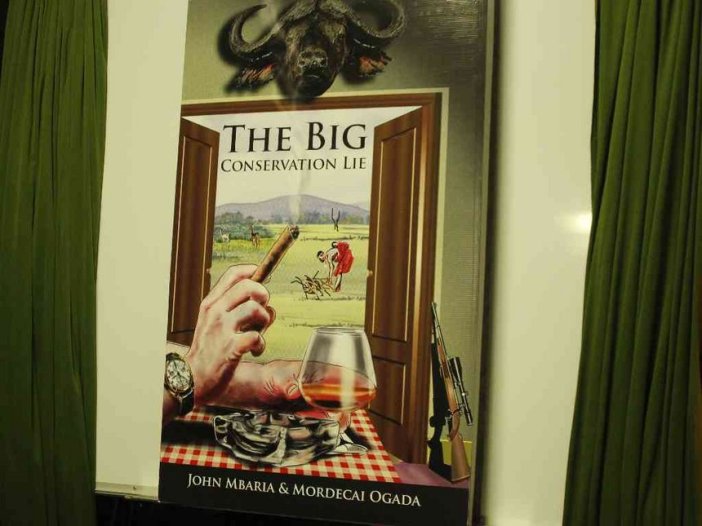
Mbaria and Ogada share their personal and professional experiences on the intricacies between race, conservation, dispossession, raw capitalism, environmental destruction, community livelihoods, exploitative research and so much more. I think this is one of the most important books to emerge out the conservation arena in Africa in recent times. It a powerful critique of white corruption and conservation in Kenya. The overarching themes of the book include:
- Who benefits from the conservation of wildlife in Kenya?
- Who shapes the conservation agenda?
The goal of this blogpost is to share some stories that reinforce some of the arguments that Mbaria and Ogada are making, as well as to offer some possible solutions.
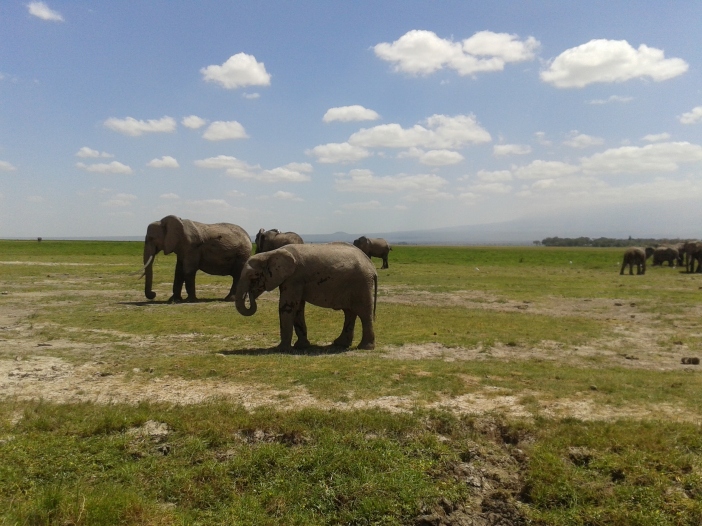
So, what exactly did Basketmouth mean?
Basketmouth might have been joking, but the image of white men(they are mostly male characters) taking to the wild, devoting their lives to saving wild animals, and engaging in sensually captivating adventures has forever been used to drive the point home that as the planet experiences immense destruction of species, habitats, and ecosystems, it is only white people who really care. Conservation is now almost exclusively associated with whiteness.
What is the place of Africans in the conservation landscape?
Usually, black people are featured either as cargomen, props, victims, or as hinderances to the conservation enterprise. In most instances, black Africans are portrayed as people who need to be sensitized, so that they can either accept or learn to love the animals that live in their midst or the wilderness they inhabit.
Now, these are issues that quite close to my heart. And I have blogged about this before in Saving Africa from Africans. I highly, highly, resent the idea that Africans do not know or are not interested in conservation, and have actually spent the last 12 years of my life trying to dispel or at least understand this myth. The latest of these ventures is through my PhD research on Indigenous Knowledge Systems and forest governance. Why has this idea that Africans do not care about conservation become so widely accepted, including by Africans themselves? It is argued that Africans do not know conservation because they do not know how to uhhh and ahhh when they see animals. Loving wildlife is reduced to uuhing and aahhing, and attempts at domesticating them by giving them names like Tom, and petting them. These kinds of ideas are completely incongruent with African conservation and environmentalism. The connections that Africans have with their landscapes are more deeper and sophisticated than this superficial and empty romanticization. Let us all do our own research-you have your grandparents or other elders in our community. Ask them what relationships they forged with wildlife or the environment in general, especially before the encounter with colonialism and Jesus. The answers might surprise you. If you are in Kenya and know any Mau Mau guerrillas, ask them how they survived in the forests that are inhabited by wild animals – for close to 10 years.
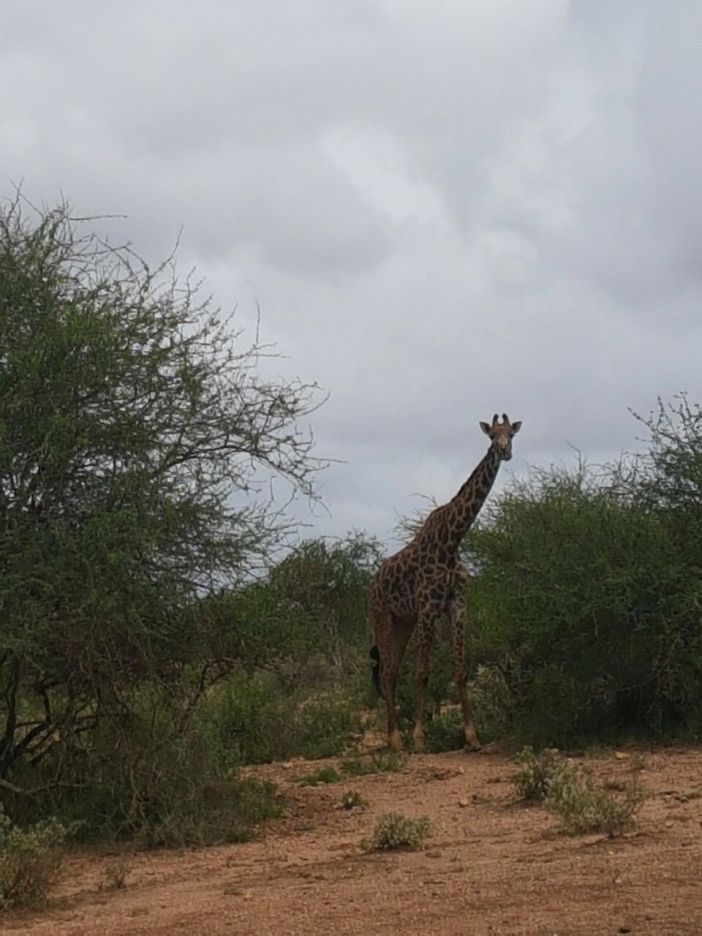
Where are the African conservationists? Mbaria and Ogada argue that the conservation arena is fed by self-propagating hero worship. All these heroes are white. Take the case of George Adamson and his domestication of lions. A couple of years ago, the Kenya Wildlife Service posted a picture of George and “his lions” on their facebook page. I asked them if they are promoting the domestication of wild animals? The rebuttal was quick – “We are celebrating someone who has contributed immensely to conservation in Kenya.” Yawn! I then asked them why I have never seen any celebration of African conservationists. They never came back to me.

Another good example is Karen Blixen, whose story is told in the movie ‘Out of Africa’. The movie opens with the line “I owned a farm in Africa” the correct opening line should be “I stole a farm in Africa.” I want to use the example of Blixen to demonstrate that the white capture of conservation extends beyond wildlife conservation into the cultural heritage conservation realm. Blixen was an out-and-out racist who argued that she understood Africans better after interactions with wild animals. As Ngugi wa Thiong’o writes in ‘Detained’ “In reality they [white settlers in Kenya] loved the wild game, but Africans were worse, more threatening, instinctless, unlovable, unredeemable, sub-animals merely useful for brute labour.” This was a view strongly held by Blixen. Despite this, there is a museum in her name in the colonial outpost that is known as Karen. Yes, the area is also named after her. I cannot understand why there is a museum that memorializes Karen Blixen and yet there is no museum or anything else built to memorialize the glorious struggle of the Mau Mau, who fought racial oppression and colonial domination with everything they had. Why must Africans continue to celebrate people who oppress(ed) them and think of them as sub-human?
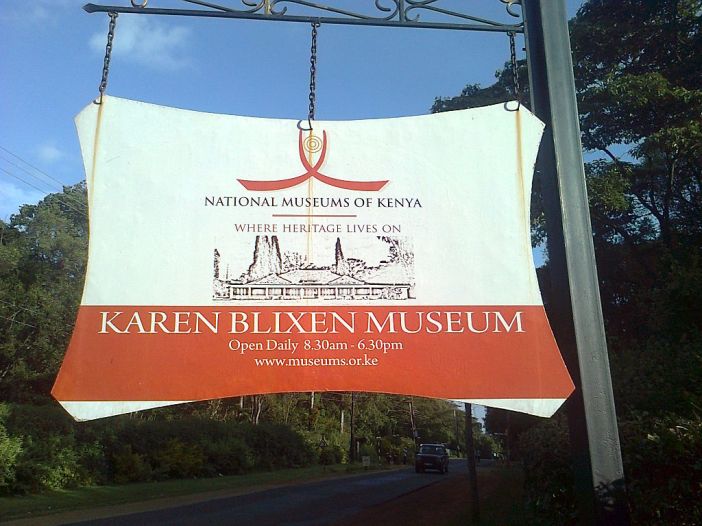
Who is reaping huge economic returns from Africa’s wilderness?
The wildlife conservation narrative in Kenya, as well as much of Africa, is thoroughly intertwined with colonialism, virulent racism, deliberate exclusion of natives, veiled bribery, unsurpased deceit, a conservation cult subscribed to by huge numbers of people in the West, and severe exploitation of the same wilderness conservationists have constantly claimed they are out to preserve.
A truly, truly depressing example of exploitation that is given in the book centres around a tree known as Prunus africana, whose bark is used for treatment of prostrate cancer. Jonathan Leakey preyed on the indigenous knowledge of Africans, and obtained a permit to exploit and export the bark and made a tidy sum. The permit was obtained from his brother Richard Leakey, who is an obiquitous presence in the Kenyan conservation arena. Let us even assume that Jonathan had not been given the permit. If he walked into a community somewhere and started talking to people, wouldn’t they give him this information and access to the trees? Have you seen how people in any part of Kenya react when they see a white person? Everybody goes out of their way to help. And by the way, in Kenya, the term researcher is associated with a white person. This person just preyed on the hospitality of Africans and emerged out of this interaction with loads of money. The hospitable Africans got nothing. Nobody thinks that a white person can be up to no good. We always think they want to help us. This idea is so strongly ingrained and extremely dangerous. Why do Africans think that the people who enslaved them, colonised them, and neocolonise them want to help them? We have not really learnt how to protect what is really ours. That includes knowledge.

What is the role of the government in all this? A friend of mine told me a story a couple of years ago. I think it will help answer this question.
There is a city somewhere in the Congo rain forest. This city was established during the colonial period as a retreat/holiday space for the colonial brigade. After independence, more Africans moved into the city. The government wanted to expand infrastructure in order to serve the public. This would entail the clearing of some trees. A Nordic country successfully blocked this, citing conservation concerns. Hence people live in squalor without basic services like sewer lines, water infrastructure, etc. The perils of flag independence! The government is a powerless. Direction on conservation strategy comes from the west. The white capture of conservation in Africa is total, thorough, and uncompromising.
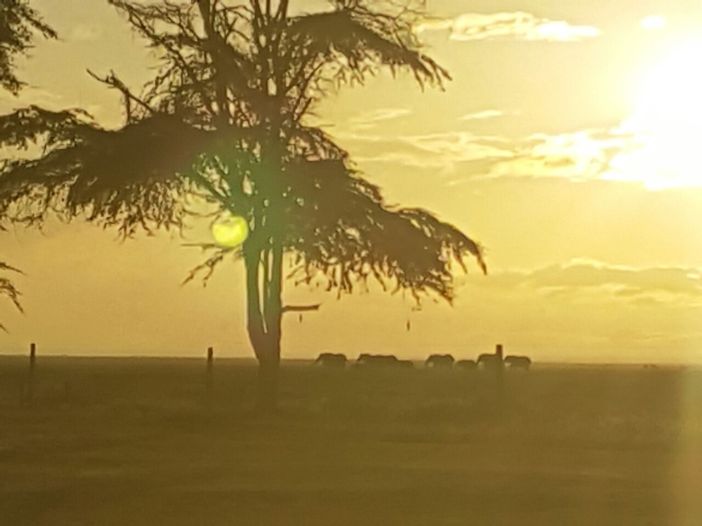
Let me give you another example. This is in regards to nominating sites into the UNESCO World Heritage List. The process works like this: A country nominates a site to be a world heritage site. Once the site goes through all the hoops at the UNESCO level, somebody is sent to evaluate the site in situ. This consultant writes a report on whether the site you are proposing is deserving of world heritage status or not. In all the instances I know for African sites, the consultant has always been a white person. I do not know of any instance where an African has ever been commissioned as a consultant to evaluate any site either on the African continent or elsewhere. Can we envision a situation where an African goes to evaluate a site in Europe, for instance? And needless to say, these consultant are paid handsomely. You cannot acquire world heritage status without white approval. Also, can we envison a situation where a Kenyan owns 100,000 acres of land in the UK and turns it into a conservancy? This is satirized in this conservation conundrum.
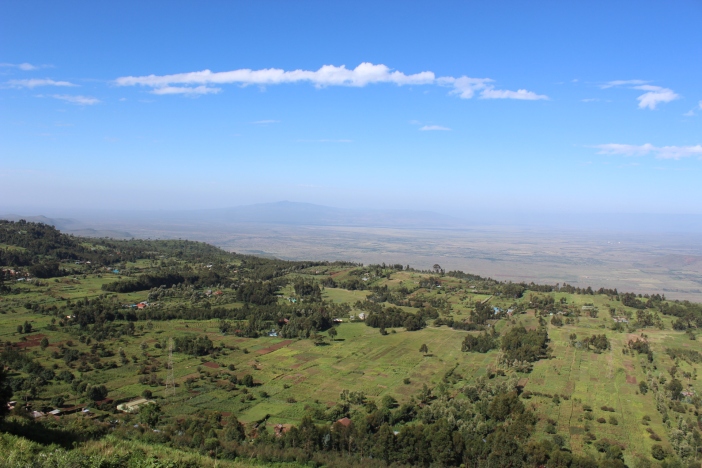
Tourism and conservation. In kenya, these are siamese twins.
In ‘The wretched of the earth’, Fanon writes:
The national bourgeoisie will be greatly helped on its way towards decadence by the Western bourgeoisies, who come to it as tourists avid for the exotic, for big-game hunting and for casinos. The national bourgeoisie organizes centres of rest and relaxation and pleasure resorts to meet the wishes of the Western bourgeoisie. Such activity is given the name of tourism, and for the occasion will be built up as a national industry…Because it is bereft of ideas, because it lives to itself and cuts itself off from the people, undermined by its hereditary incapacity to think in terms of all the problems of the nation as seen from the point of view of the whole of that nation, the national middle class will have nothing better to do than to take on the role of manager for Western enterprise, and it will in practice set up its country as the brothel of Europe.
I want to illustrate this aspect of the turning of a country into the brothel of Europe.
I once went with a friend to a hotel in Nairobi. This hotel has an in-house dance troupe which entertain tourists. We were excited to see the dances. My friend and I were among the very few Africans there. The place was packed with white people with cameras. In Kenya, tourist=white person. When we say we want tourists to come, we do not mean people from Papua New Guinea. Nor do we even mean Kenyans who live next to the so-called tourist attractions. The show starts. It is good. It keeps getting exciting. At some point, the ladies dance is a way that reveals their behinds. The sway the skirt upwards and there, the bum is fully exposed. The tourists click away. My friend and I turn to each other and ask “what was that?” It is not all of them who showcase their behind. It is selected, slender, light skinned ones. It is pathetic. It is very pathetic. It is disgusting. I have never gone back to that hotel. By the way, this dance troupe had come to perform at my university and there were no bum-showing stunts! You know why? There were no white people there. It is their fantastic performance at my university that made me want to see them again, hence the visit to the hotel.
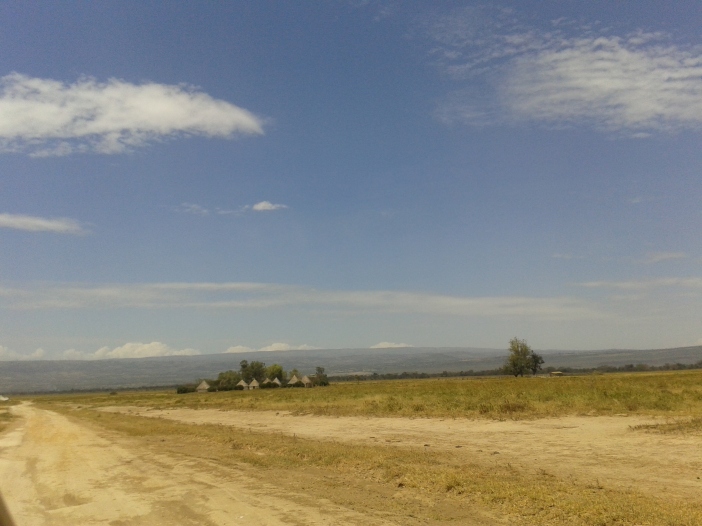
If you want to see who controls the conservation industry in Kenya look no further than the Cabinet secretary’s facebook page. She is is always posting pictures of signing MOU’s or other agreements with some foreign entities known as “development partners”. It feels like Kenya has been sold.
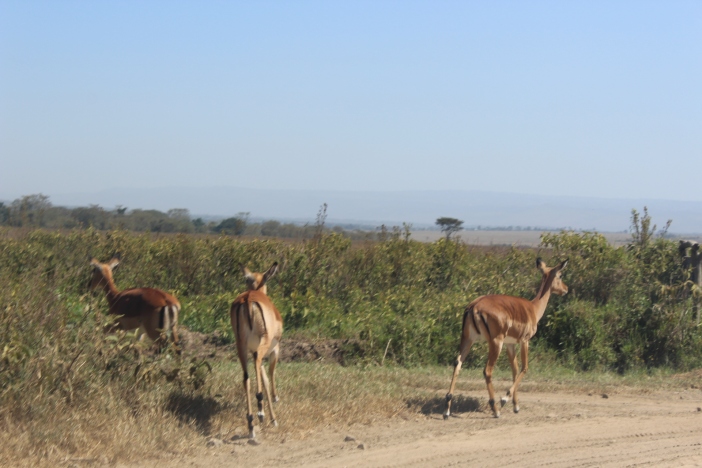
Another story: I once went for a meeting at the Karen Country Club. I was one of 2 Africans there. The meeting began with a presentation. After that, there was a discussion. Most of the time was spent bashing the Kenya Wildlife Service. I have never felt more out of place. That was the first and last meeting I ever attended.
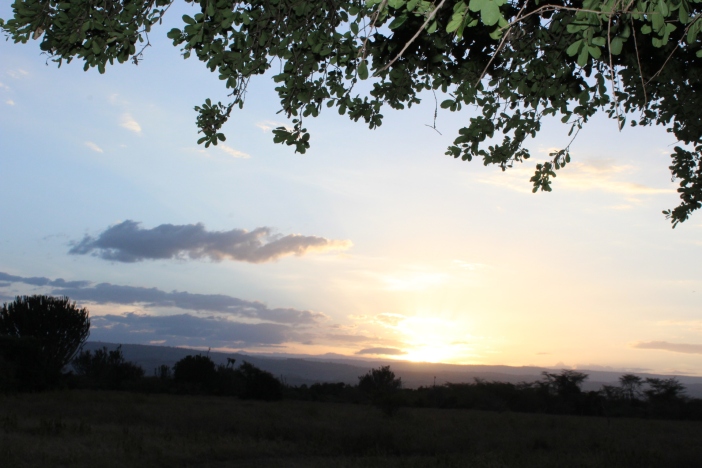
So why not start your own NGOs ?
Conservation NGOs must also be seen to toe the racial line; one can only succeed in the NGO world if they are white or have a close and preferably familial or business affiliation with one or more members of the Kenya white community. Starting an American chapter or getting and American to sit on the board is an added advantage.
Look at this article that showcases 25 top conservationists in Africa. Tell me how many Africans you see there.
Why does this kind of situation persist?
I think it comes down to governance. Failure of the state to put public interests first. Failure of government to support local conservationists. Colonized mentality that reinforces the idea that Africans do not know conservation. It also persists because the state itself is captured by the white NGO lobby.
I was invited to a meeting to discuss Indigenous Community Conservation Areas(ICCAs) and the possibilities for implementation of this type of conservation in Kenya a few months ago. During the discussions one of the participants made a claim that the Kenya Forest Service (KFS) was presiding over the destruction of forests in Kenya. A representative from the Ministry of environment took issue with that and asked him to substantiate. The debate went on and on. Then, during tea break, we the Africans congregated at one table. The discussion continued. Several other Kenyans supported the person who had made the claim about KFS. Then, the person from KFS said something astonishing. He said: “Even if it is true, you cannot say that in the presence of donors.” In Kenya, donors, like tourist =white person. There were several white people there representing various international organizations, the UN etc. This probably is the root cause of the situation that we find ourselves in. The government is not accountable to the people, is not interested in what the people think or feel, it is more interested in pleasing donors. Subsequently people lose faith in the government and chose to work with NGOs or to just give up all together. Quagmire.
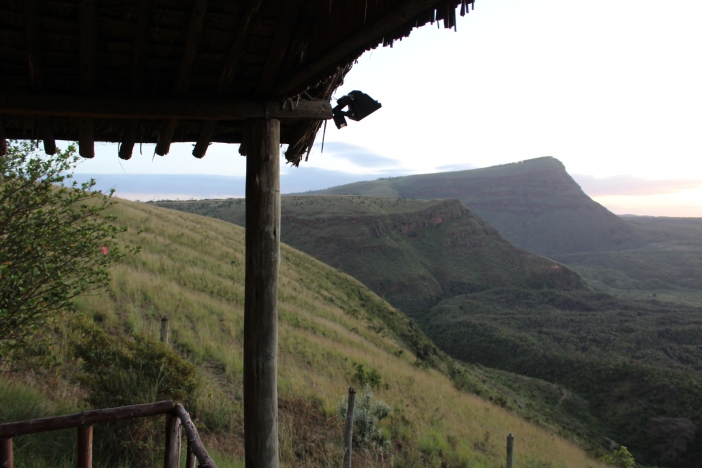
What is to be done?
- Talk about these things openly. You cannot solve a problem if you do not understand it. You cannot solve a problem if you do not even know that it exists. Ogada and Mbaria have provided a solid foundation from which these issues can be interrogated.
- We must get governance right. We must have people who care about the public and put their interests first. Without this, nothing will work in our favour. It is not just in conservation, it is in all other aspects of life. We must all engage with politics constructively. Being apolitical enables the system of exploitation.
- Africans must stop thinking that white people love them and want to help them. Everybody is in the conservation sector for economic or other interests. If you do not believe this ask yourself why a lot of the settlers who own huge tracts of land have now turned their land into “conservancies”. And if you do not find this convincing think of this:
A question well worth asking in Kenya is which sector makes the most money per elephant in Kenya- the government, the poachers, the tourism investors, or the conservationists.
4. Africans should support African conservationists in which ever way they can. By conservationists, I do not mean only those people who are formally trained. Some of the most formidable conservationists in the African context are people who work the landscapes and waterscapes on a day to day basis-farmers, pastoralists, fishermen, hunters and gatherers, etc
5. Education. Education. Education. I do not mean formal education alone. Let us all strive to learn what African conservation really means. Talk to elders, talk to farmers, teach others, learn from others, write about it, speak about it, film it, share it. Educating ourselves has to be a deliberate project. We must continue striving for freedom in all spheres of engagement.
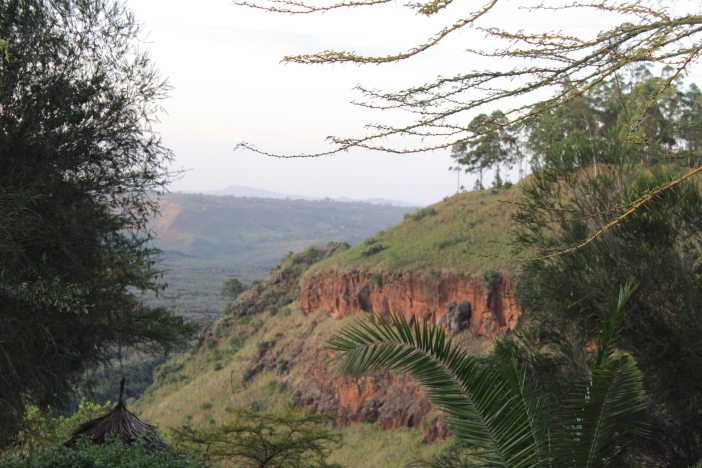
Ha!I should get this book—I am not sure why I didn’t think much of it when I saw it.You know what irks me…like really really really irks me….is the sprawling of these conservancies.I wanted to visit one,you know spend a few nights there, right in the middle of this ‘conservancy’ and looked it up.The price indicated there is downright RIDICULOUS!!No one will convince me that spending $600 a night there has nothing to do with excluding people who were born and live in the same country that houses this conservancy.Goodness!What a world!
LikeLiked by 1 person
Thanks for reading Teresia. You should definitely get the book. It will give an understanding of how murky the whole conservation industry is. I agree with you, the pricing is meant to keep the watu away – sanitizing of of the landscape of Africans. They only appear there as waiters,porters, tour guides…but even this last one is not guaranteed.
LikeLike
I have always had a faint sense of this sad eploitative scenario, the whole of it, while working in conservation circles here in America, but with my white privelege, of course I couldn’t know how deep that goes and how awful it is. I’m truly so sorry. Not ALL of us are jerks. I promise. This entry was a fascinating read, and it brings up really important facts, facts that I hope many Africans are thinking about as we move into the future of conservation. I hope it will change, but conservation is indeed a murky business, a multi-facetied and complicated thing with corruption throughout, and who loses? The African people, the land and the animals themselves. Whites (men) have clearly not done a good job at conservation, more like the ‘CON’ in conservation. I for one, have never thought that black Africans don’t love and appreciate the animals and have a deep natural soul connection with them. There are some that exploit them, but abject poverty and oppression drive that, and it is usually those stories that are told, not the stories of the farmers that help the elephants or the family that has a deep connection and knowlege of the land, or the African people who love the lions or the children who see these animals and feel a deep deep connection with them. The stories we (still) hear in America are of the black poachers fueling the Asian trade of lion bones and ivory, the stories of the black farmers who snare lions because they kill their livestock. It isn’t all like that. Why are these stories still highlighted and told? Because, sadly, racism is alive and well in the world today.
I must get that book and read it. Your blog is wonderful and I’m glad I found it. So many things in this world make me feel ashamed to be white. Having a look at what is going on in my own country today is horrifying. I don’t know how to heal it or stop it, but I do not want to be a part of oppression in any way. How can I be a good person when I visit Africa? How can I help and not hurt?
LikeLike
BigCatAdvocate, thank you for reading and for your well articulated thoughts. Two quick comments: 1. I do not think white women are as innocent as you seem to portray. White women have been accomplices in the exploitation of OTHERS all over the world. Some have been involved with direct exploitation. It is not just a white male thing. And if they do not directly participate, then they benefit from the loot and plunder of others. 2. “How can I be a good person when I visit Africa? How can I help and not hurt?” I want to comment on the helping part. Why do white people think of Africa like this? Do you not think that Africans can help you? I know many people who have been helped by Africans. I do not blame you. It is the media and popular discourse that has cast Africa as a terminally ill patient that needs to be cured by Dr. West. Question – how can you be the doctor if you are the disease. Why don’t white people feel they can learn about conservation from Africans. Some of the greatest conservation lessons I have learnt have come from Africans. When I travel to the USA or anywhere, I never think – how can I help the people in X or Y. No, I think – what can I learn about the people, the culture, maybe forge friendships, understand other people’s struggles etc. I am enjoying these conversations, by the way. I think you will like this: https://www.ted.com/talks/chimamanda_adichie_the_danger_of_a_single_story
LikeLike
Every African should read this brilliant article.
LikeLiked by 1 person
Thanks Kwamesa! Share widely.
LikeLike
Great article Kendi! I’m gathering information on something that will be of great interest to you…
LikeLike
Thanks for reading Violet. I look forward to what you are working on.
LikeLike
Well, boo-hoo! sorry but I think this conservation narrative is best articulated in English to the people who have the funds. Our African elite would rather they wore the lion around the loins and on the head to prove a good folklore point on who is the man on top now!. The compassion for the lion could be best portrayed by a quick bullet to the head to save the goats and screaming cheerleaders of its existence! Remember Mohawk? These wonderful authors and conservators should be discussing how to tell the African story to effect conservation when their folk are out-fishing and out-poaching the natural habitat to extinction. i agree we were colonized and whether it was a good or bad thing is subject for good conjecture, but i dare say, since you have kissed no fish and called it ‘Tom’ for conservation- sake, keep writing and add more fire to it or keep making the fire to add more of the writing to.
LikeLike
David!
Haaaaaaaaaaaaaaaa!! I am laughing so hard about the lion around the loins and head. Thanks for reading the blog. Two quick things 1. I agree with you on articulating what conservation is or should be from an African perspective. Actually, both authors are strong and sincere advocates for exactly that. 2. “effect conservation when their folk are out-fishing and out-poaching the natural habitat to extinction” I take issue with this statement and classify it among the conservation lies. The overriding narrative in this field is that Africans are destructive and are all poachers – a statement that is not supported by nothing more than just racist ideologies and conjecture. I know and have worked with many Africans who are working tirelessly to protect their landscapes – and mostly without govt support. Those are the conservationists I am interested in, and not the ones who hop from one international meeting to another to say how they are conserving Africa!
About Tom and Mohawk and such-like projects of naming wildlife after humans – all that is CONservation. Stay tuned for a blog post on the difference between CONservation and Conservation. Thanks again for your feedback.
LikeLike
Hello Kendi,
Great Article, It spiked my interest to read the book. Could you kindly advise me where I can buy this book from in Nairobi?
LikeLike
Try the Kenya Museum Society Library. It is a great book. Worth your time.
LikeLike